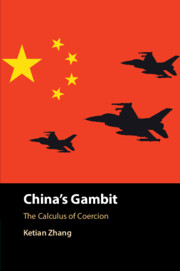Book contents
- China’s Gambit
- China’s Gambit
- Copyright page
- Dedication
- Contents
- Figures
- Acknowledgments
- Abbreviations
- 1 Introduction
- 2 The Cost-Balancing Theory
- 3 Coercion in the South China Sea
- 4 Sino-Japanese Disputes in the East China Sea
- 5 Coercion in Cross-Strait Relations
- 6 Tibet and the Dalai Lama Visits
- 7 Conclusion
- References
- Index
1 - Introduction
Published online by Cambridge University Press: 30 November 2023
- China’s Gambit
- China’s Gambit
- Copyright page
- Dedication
- Contents
- Figures
- Acknowledgments
- Abbreviations
- 1 Introduction
- 2 The Cost-Balancing Theory
- 3 Coercion in the South China Sea
- 4 Sino-Japanese Disputes in the East China Sea
- 5 Coercion in Cross-Strait Relations
- 6 Tibet and the Dalai Lama Visits
- 7 Conclusion
- References
- Index
Summary
The media and US foreign policy elites paint a pessimistic picture of China’s behavior and the likelihood of major conflicts. However, they fail to capture the curious variation in China’s coercive behavior, which is much more nuanced than simplistic predictions that war is imminent. For one, despite the countless forecasts of major wars involving China over the past decade, China has not fought a war since the 1988 Sino-Vietnamese maritime skirmish. Instead, China utilizes a full spectrum of coercive tools, ranging from diplomatic and economic sanctions to gray-zone measures and military coercion. This book examines when, why, and how China attempts to coerce states over threats to its national security. I propose a new cost-balancing theory to explain China’s coercion decisions, while discussing the broader implications for international relations in the concluding chapter. I show that instead of coercing all states and prioritizing military coercion, China is a cautious actor that balances the benefits and costs of coercion. The book identifies the centrality of reputation for resolve and economic cost in driving whether China coerces or not.
- Type
- Chapter
- Information
- China's GambitThe Calculus of Coercion, pp. 1 - 12Publisher: Cambridge University PressPrint publication year: 2023

